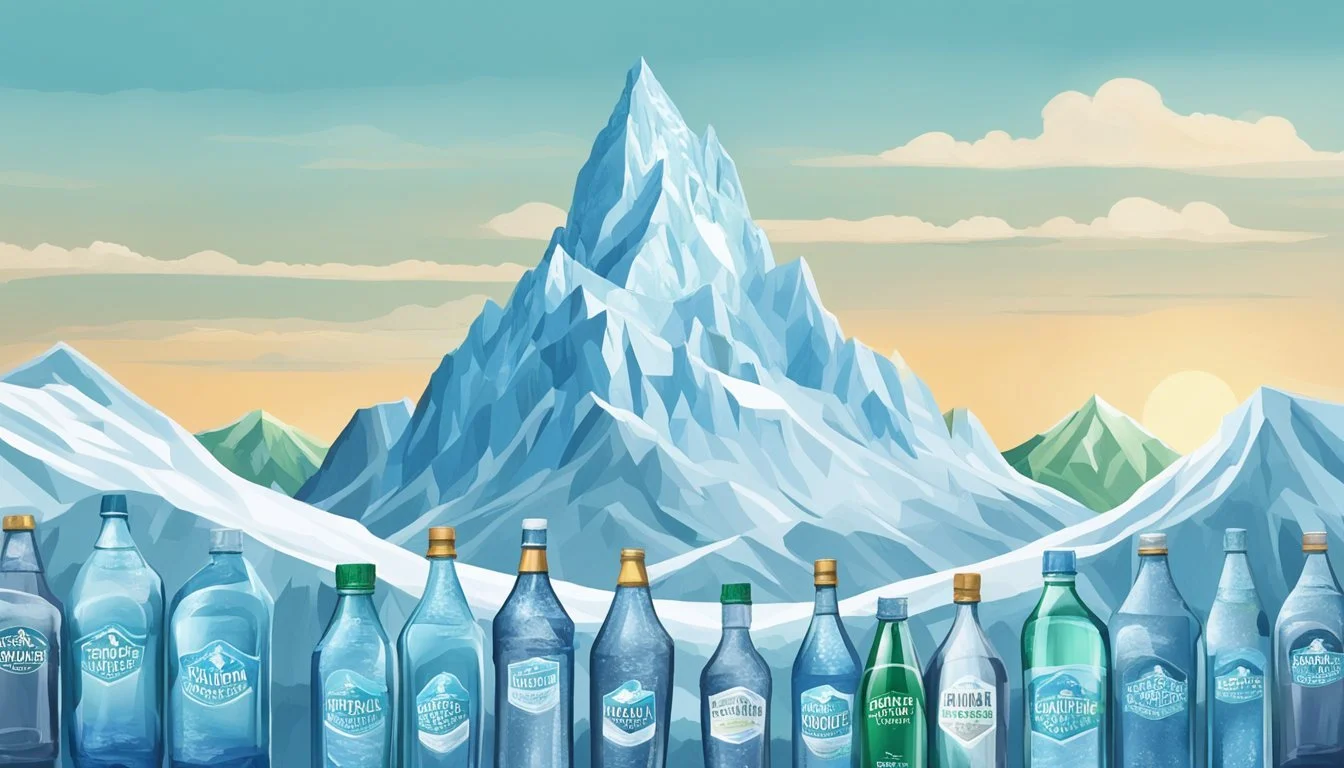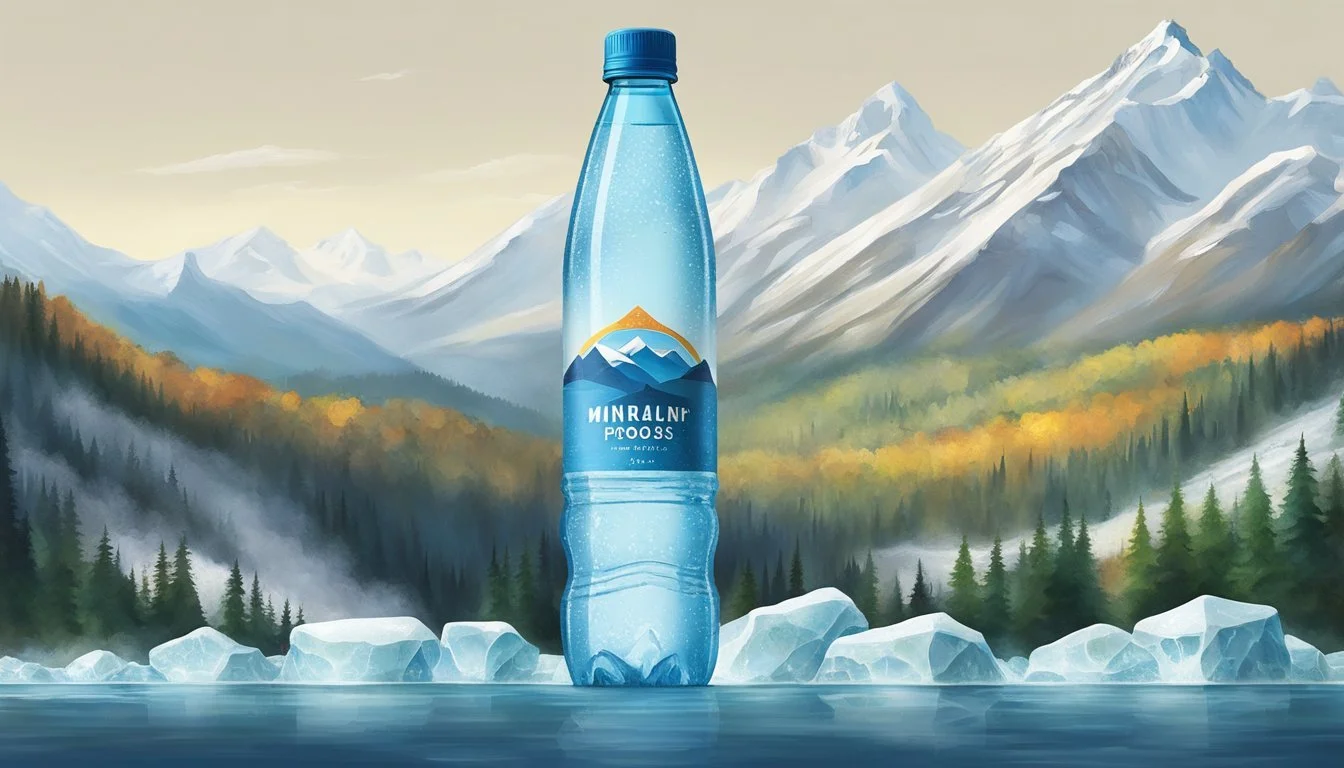Ice Mountain vs. Whole Foods Italian Still Mineral Water
Comparative Quality Analysis
Choosing the right bottled water can be an important decision, especially for those conscious about taste, purity, and sourcing. Ice Mountain Water, adhering to strict FDA and IBWA standards, ensures a safe and purified option for daily hydration. However, microplastic contamination remains an industry-wide conce
Conversely, Whole Foods Italian Still Mineral Water, sourced from various natural springs across Italy, offers mineral-rich content that complements its crisp and refreshing taste. The tradition of Italian mineral water makes it a staple in fine dining and a favorite among water connoisseurs.
When comparing Ice Mountain and Whole Foods Italian Still Mineral Water, the latter's richer mineral content and exceptional taste often make it preferable for those seeking a premium experience. Yet, the widespread availability and rigorous safety measures of Ice Mountain provide a reliable choice for many consumers.
Overview of Bottled Water
Bottled water has become a popular alternative to tap water due to its perceived purity and convenience. This section explores the nutritional composition, health benefits, and federal regulations governing bottled water to provide a comprehensive understanding of this essential beverage.
Nutritional Composition
Bottled water typically varies in mineral content depending on its source. Minerals such as calcium, magnesium, and potassium are often present. These minerals can contribute to daily intake but in varying degrees.
Carbonated bottled waters may contain added sodium to enhance taste. Regular bottled water, especially from natural springs, can have a balanced mineral composition compared to distilled or purified water, which often lacks minerals.
Health Benefits and Hydration
Bottled water supports hydration, which is crucial for maintaining bodily functions. Proper hydration aids in digestion, nutrient transportation, and temperature regulation.
Calcium and magnesium found in some bottled waters can support bone health and muscle function. Compared to sugary beverages, bottled water offers a zero-calorie option, making it beneficial for weight management.
Toxic PFAS chemicals, found in some carbonated water brands, are a health concern. It’s essential to consider the source and composition of bottled water to avoid potential risks.
Federal Regulations and Safety Standards
Bottled water safety is ensured through regulations enforced by the FDA and EPA. The FDA oversees bottled water as a packaged food product, ensuring it meets set safety standards.
EPA regulations primarily govern contaminants in tap water but influence bottled water standards indirectly. Bottled water companies must comply with labeling requirements, disclosing the water's source and treatment methods.
Testing for contaminants such as bacteria, heavy metals, and industrial chemicals ensures bottled water's safety. Adherence to these regulations guarantees that bottled water remains a safe and viable hydration option.
Quality and Taste Analysis
Examining the quality and taste of Ice Mountain and Whole Foods Italian Still Mineral Water involves evaluating their mineral content and taste profiles, supplemented with insights from water sommeliers.
Comparison of Mineral Content
Mineral content significantly influences the quality and health benefits of bottled water. Ice Mountain is spring water, known for its balanced mineral composition. It has modest levels of calcium, magnesium, and potassium, making it a mild and generally palatable choice.
Mineral Ice Mountain (mg/L) Whole Foods Italian Still (mg/L) Calcium 9 60 Magnesium 2 15 Sodium 3 5 Potassium 1 1
Whole Foods Italian Still Mineral Water, sourced from Italian springs, contains higher levels of calcium and magnesium. This gives it a more robust mineral profile compared to Ice Mountain. Magnesium and calcium are particularly beneficial for bone health, so the higher content in Whole Foods’ option might appeal to health-conscious consumers.
Understanding Taste Profiles
The taste of bottled water is subtly influenced by its mineral makeup. Ice Mountain has a clean, crisp taste with a slight hint of sweetness, thanks to its balanced mineral levels. It feels light on the palate, making it a popular choice for everyday hydration.
Whole Foods Italian Still Mineral Water offers a richer and more complex taste experience. The higher calcium and magnesium content lends a slightly more pronounced mineral taste. This could be appealing to those who enjoy a more substantial mouthfeel in their water. The taste is still smooth but has a characteristic flavor that distinguishes it from other brands.
Water Sommelier Insights
Water sommeliers provide expert assessments on the sensory qualities of water. According to them, Ice Mountain is appreciated for its unassuming yet refreshing profile. Its light mineral content ensures that it does not overpower the palate, making it versatile for various occasions.
In contrast, Whole Foods Italian Still Mineral Water is noted for its distinct mineral notes. Sommeliers highlight its sophisticated taste, which stands out due to the higher mineral concentrations. This choice is often recommended for pairing with meals or for those who appreciate nuanced flavors in their water.
Both waters offer unique qualities that cater to different preferences, highlighting the diverse world of bottled mineral waters.
Water Sources and Origin
Ice Mountain and Whole Foods Italian Still Mineral Water come from distinct sources, impacting their taste and quality. Ice Mountain derives its water from natural springs in the United States, while Whole Foods' Italian Still Mineral Water is sourced from springs in Italy.
Spring Sources vs. Aquifers
Ice Mountain:
Ice Mountain primarily sources its water from natural springs located in Michigan and other surrounding areas. These springs collect water naturally filtered through geological formations, providing a clean and crisp taste.
Whole Foods Italian Still Mineral Water:
The source of Whole Foods Italian Still Mineral Water is the springs in Italy, specifically from regions like Marche. This water gushes from springs situated high in the mountains, such as the Panico del Monte Bove spring, ensuring low mineral content and natural purity.
Differences in Origin:
Ice Mountain: Predominantly sourced from the Great Lakes region in the U.S.
Whole Foods Italian: Originates from high-altitude springs in Italy, known for their purity.
Environmental Impact and Sustainability
Ice Mountain and Whole Foods Italian Still Mineral Water have differing practices that impact their ecological footprints.
Assessment of Bottling Processes
Ice Mountain bottles its water in plastic bottles, which are made from petrochemicals. This method has significant environmental implications. The production of plastic involves the extraction of oil, a non-renewable resource. Additionally, the Environmental Protection Agency (EPA) notes that the manufacturing process can release harmful emissions.
Whole Foods Italian Still Mineral Water, on the other hand, typically uses glass bottles. Glass production also has environmental costs, but it is generally considered less harmful than plastic. Glass is inert and non-toxic, which means there is no risk of leaching chemicals like PFAS or heavy metals into the water.
Impact of Plastic and Glass Bottles
Plastic bottles used by Ice Mountain are widely recyclable, but the actual rate of recycling remains low. The improper disposal of plastic can lead to environmental contamination and harm marine life. The EPA highlights that plastic waste can persist in the environment for centuries, contributing to pollution and long-term ecological damage.
Whole Foods' use of glass bottles presents a different challenge. Although glass is more sustainable and can be recycled indefinitely, the production process is energy-intensive. However, glass recycling is more effective and less damaging to the environment compared to plastic. Additionally, glass doesn't pose the same risks of chemical contamination as plastic does, making it a safer choice for consumers concerned with PFAS and heavy metals.
Consumer Considerations
Consumers looking to choose between Ice Mountain and Whole Foods Italian Still Mineral Water should consider factors like labeling transparency and pricing. These considerations can affect both health and convenience.
Labeling and Transparency
Consumers benefit from clear labeling to understand the contents of their bottled water. Both Ice Mountain and Whole Foods provide some degree of transparency.
Ice Mountain generally lists the source and mineral content on their labels, aligning with guidelines from the International Bottled Water Association.
Whole Foods Italian Still Mineral Water also details its origin, often highlighting its Italian heritage. Consumer Reports has found issues with certain brands, such as arsenic levels in some bottled water, but transparency about testing can provide assurances.
Pricing and Accessibility
Pricing remains a crucial factor for many consumers. Ice Mountain tends to be widely available in supermarkets across the United States, often priced competitively.
Whole Foods Italian Still Mineral Water might come at a premium, reflecting its imported status and mineral content. Accessibility could also be limited to Whole Foods Market locations, potentially making it less convenient for some buyers.
Both water brands cater to different market segments, with Ice Mountain offering affordability and widespread availability, while Whole Foods targets consumers interested in premium, international options.
Brand Profiles
Understanding the distinct aspects of Ice Mountain and Whole Foods Italian Still Mineral Water is crucial for making an informed decision. This section explores each brand's history, essence, and market presence to highlight their unique attributes.
Ice Mountain: Company Overview
Ice Mountain is a brand under the Nestlé Waters North America umbrella. Established in the early 2000s, Ice Mountain sources its water from natural springs in the Midwest United States.
Ice Mountain positions itself as a dependable choice for natural spring water. Their water undergoes minimal processing to retain its natural mineral content. Nestlé emphasizes sustainability in its operations, focusing on environmental conservation and ethical sourcing practices.
Convenience is key, with Ice Mountain available in various sizes, catering to diverse needs from personal hydration to family trips. Their commitment to quality and reliability has made them a staple in many American households.
Whole Foods Italian Still Mineral Water: Brand Essence
Whole Foods Italian Still Mineral Water is marketed as a premium product, drawing from trusted sources in Italy. The water is sourced from renowned Italian springs, known for their high-quality mineral content.
Whole Foods leverages its reputation for natural and organic products to enhance the appeal of this water. The brand ensures strict quality control and offers transparency in its sourcing and production practices, emphasizing purity and health benefits.
This Italian still mineral water has a refined mineral profile, which enhances its taste and appeal. Whole Foods targets consumers seeking high-quality, health-oriented beverages that align with a natural and organic lifestyle.
Comparative Market Presence
Ice Mountain and Whole Foods Italian Still Mineral Water operate in distinct market segments. Ice Mountain, with its broad distribution network, dominates the mainstream bottled water market in the U.S. Its affordability and accessibility make it a popular choice among a wide consumer base.
In contrast, Whole Foods Italian Still Mineral Water caters to a niche market. It targets consumers at Whole Foods Market who prioritize premium, health-focused products. The brand’s appeal lies in its Italian heritage and the perceived superior quality.
Ice Mountain benefits from the robust distribution capabilities of Nestlé, while Whole Foods capitalizes on its brand loyalty and the upscale positioning of Italian water brands.
Filtering Methods and Water Purity
The filtering methods and water purity of Ice Mountain and Whole Foods Italian Still Mineral Water reveal significant differences in their production processes. This section will explore the distinctions in home filtration versus bottled water and the technologies used in water purification.
Home Filtration vs. Bottled Water
Home filtration systems come in various forms such as activated carbon filters, reverse osmosis systems, and UV filters. These systems aim to remove contaminants like heavy metals, chlorine, and bacteria. While home filtration provides convenience and control over water quality, it may not match the consistency and thoroughness of industrial processes used by bottled water companies.
Ice Mountain, for instance, employs a multi-step filtration process involving screening and other advanced techniques to ensure the removal of large particles and contaminants. This rigorous filtering process helps maintain the purity and taste of the water. In contrast, Whole Foods Italian Still Mineral Water is naturally sourced from mineral springs in Italy, where it undergoes minimal processing to retain its mineral content and purity.
Technologies in Water Purification
Advanced water purification technologies such as reverse osmosis, UV disinfection, and activated carbon filtration are critical in producing high-quality bottled water. Ice Mountain makes use of a sophisticated multi-step filtration process, which includes reverse osmosis to eliminate impurities and contaminants. This technology effectively reduces total PFAS levels, heavy metals, and other harmful substances, ensuring clean and safe drinking water.
Whole Foods Italian Still Mineral Water leverages natural filtration methods, relying on the geological formations of the spring to purify the water. This natural process helps retain essential minerals like calcium and magnesium, contributing to the distinct taste of the water. Despite minimal processing, the stringent quality standards ensure that the water remains free from harmful contaminants.
Health Implications
Comparing Ice Mountain and Whole Foods Italian Still Mineral Water involves examining their health benefits, especially concerning alkalinity and body pH balance.
Alkalinity and Body PH
Ice Mountain water typically has a neutral to slightly acidic pH level, around 7.0. This makes it appropriate for daily consumption but may not contribute significantly to pH balance or alkalinity in the body.
Whole Foods Italian Still Mineral Water tends to be more alkaline, with a pH level around 8.0. Higher alkalinity can aid in neutralizing acidity in the body and improving digestion. Additionally, alkaline water is believed to have potential benefits for those seeking to maintain a stable bodily pH.
Both waters are low in sodium and contain electrolytes, contributing to hydration without significant health risks.
Fluid Options
When selecting between Ice Mountain and Whole Foods Italian Still Mineral Water, it is essential to understand the distinct differences and benefits of still versus sparkling water.
Choosing Between Still and Sparkling
Still Water:
Still water, such as both Ice Mountain and Whole Foods Italian Still Mineral Water, is non-carbonated and lacks bubbles. Many prefer it for drinking without the extra fizzy sensation.
Still water provides a pure hydration option without any added carbonation, making it an excellent choice for everyday drinking. Also, it generally has a neutral taste that doesn't compete with meals or other flavors.
Sparkling Water:
Sparkling or carbonated water contains dissolved carbon dioxide gas. It includes options like flavored varieties and unflavored seltzers. Some consumers enjoy the effervescent experience, finding it a refreshing alternative to still water.
However, neither Ice Mountain nor Whole Foods’ offering specifically mentions sparkling variants under the discussed product lines, focusing on non-carbonated health benefits.
Conclusion
Health:
Both Ice Mountain and Whole Foods Italian Still Mineral Water adhere to stringent health standards. Ice Mountain is generally safe for consumption, though microplastic contamination may be present. Whole Foods guarantees mineral content beneficial for health.
Quality:
Ice Mountain undergoes robust filtration ensuring purity. Whole Foods offers high mineral quality sourced from Italy.
Consumers:
Preferences vary. Some consumers appreciate Ice Mountain's accessibility and filtration. Others favor Whole Foods for its mineral content and origin.
Taste:
Ice Mountain has a clean taste, appealing to those who prefer a straightforward water profile. Whole Foods offers a balanced, mineral-rich flavor, attracting those who enjoy a distinct taste.
Environmental Impact:
Neither brand is free from environmental concerns. Ice Mountain uses plastic bottles, contributing to plastic waste. Whole Foods also packages in plastic, but often markets eco-friendly options.
Summary:
Attribute Ice Mountain Whole Foods Italian Still Mineral Water Health Safe, potential microplastics Mineral-rich Quality Robust filtration High mineral content Consumer Base Wide accessibility Premium, niche market Taste Clean, simple Rich, mineral flavor Environmental Impact Plastic use Plastic use, eco-options
Both brands offer distinct advantages. The choice ultimately depends on individual preferences for taste, health benefits, and environmental impact.
More About Ice Mountain
Core Hydration vs Ice Mountain: Which Bottled Water is Better?
Ice Mountain vs Aqua Carpatica: Which Bottled Water is Better?
Ice Mountain vs Cascade Mountain: Which Bottled Water is Better?
Ice Mountain vs Crystal Geyser: Which Bottled Water is Better?
Ice Mountain vs Crystal Lake: Which Bottled Water is Better?
Ice Mountain vs Essence pH10: Which Bottled Water is Better?
Ice Mountain vs Hawaii Volcanic: Which Bottled Water is Better?
Ice Mountain vs Hawaiian Springs: Which Bottled Water is Better?
Ice Mountain vs Icelandic Glacial: Which Bottled Water is Better?
Ice Mountain vs Kirkland Signature: Which Bottled Water is Better?
Ice Mountain vs Liquid Death: Which Bottled Water is Better?
Ice Mountain vs Mountain Valley Spring Water: Which Bottled Water is Better?
Ice Mountain vs Nestle Pure Life: Which Bottled Water is Better?
Ice Mountain vs Poland Spring: Which Bottled Water is Better?
Ice Mountain vs Proud Source: Which Bottled Water is Better?
Ice Mountain vs Purely Sedona: Which Bottled Water is Better?
Ice Mountain vs Richard's Rainwater: Which Bottled Water is Better?
Ice Mountain vs San Pellegrino: Which Bottled Water is Better?
Ice Mountain vs Simple Truth: Which Bottled Water is Better?
Ice Mountain vs Solan de Cabras: Which Bottled Water is Better?
Ice Mountain vs Talking Rain AQA: Which Bottled Water is Better?
Ice Mountain vs Whole Foods 365: Which Bottled Water is Better?
More About Whole Foods Italian Still Mineral Water
Whole Foods Italian Still Mineral water vs HFactor: Which Bottled Water is Better?
Acqua Pana vs Whole Foods Italian Still Mineral water: Which Bottled Water is Better?
Antipodes vs Whole Foods Italian Still Mineral water: Which Bottled Water is Better?
Aqua Carpatica vs Whole Foods Italian Still Mineral water: Which Bottled Water is Better?
Aquafina vs Whole Foods Italian Still Mineral water: Which Bottled Water is Better?
Arrowhead vs Whole Foods Italian Still Mineral water: Which Bottled Water is Better?
Bai vs Whole Foods Italian Still Mineral water: Which Bottled Water is Better?
Boxed Water vs Whole Foods Italian Still Mineral water: Which Bottled Water is Better?
Castle Rock vs Whole Foods Italian Still Mineral water: Which Bottled Water is Better?
Core Hydration vs Whole Foods Italian Still Mineral water: Which Bottled Water is Better?
Deer Park vs Whole Foods Italian Still Mineral water: Which Bottled Water is Better?
Erewhon vs Whole Foods Italian Still Mineral water: Which Bottled Water is Better?
Essentia vs Whole Foods Italian Still Mineral water: Which Bottled Water is Better?
Eternal vs Whole Foods Italian Still Mineral water: Which Bottled Water is Better?
Ethos vs Whole Foods Italian Still Mineral water: Which Bottled Water is Better?
Evian vs Whole Foods Italian Still Mineral water: Which Bottled Water is Better?
Fiji vs Whole Foods Italian Still Mineral water: Which Bottled Water is Better?
Flow vs Whole Foods Italian Still Mineral water: Which Bottled Water is Better?
Hawaii Volcanic vs Whole Foods Italian Still Mineral water: Which Bottled Water is Better?
Hawaiian Springs vs Whole Foods Italian Still Mineral water: Which Bottled Water is Better?
Icelandic Glacial vs Whole Foods Italian Still Mineral water: Which Bottled Water is Better?
Just Water vs Whole Foods Italian Still Mineral water: Which Bottled Water is Better?
LIFEWTR vs Whole Foods Italian Still Mineral water: Which Bottled Water is Better?
Liquid Death vs Whole Foods Italian Still Mineral water: Which Bottled Water is Better?
Mananalu vs Whole Foods Italian Still Mineral water: Which Bottled Water is Better?
Nestle Pure Life vs Whole Foods Italian Still Mineral water: Which Bottled Water is Better?
Origin vs Whole Foods Italian Still Mineral water: Which Bottled Water is Better?
Ozarka vs Whole Foods Italian Still Mineral water: Which Bottled Water is Better?
Path vs Whole Foods Italian Still Mineral water: Which Bottled Water is Better?
Penta vs Whole Foods Italian Still Mineral water: Which Bottled Water is Better?
Perrier vs Whole Foods Italian Still Mineral water: Which Bottled Water is Better?
Poland Spring vs Whole Foods Italian Still Mineral water: Which Bottled Water is Better?
Purely Sedona vs Whole Foods Italian Still Mineral water: Which Bottled Water is Better?
San Pellegrino vs Whole Foods Italian Still Mineral water: Which Bottled Water is Better?
Smartwater vs Whole Foods Italian Still Mineral water: Which Bottled Water is Better?
Solan de Cabras vs Whole Foods Italian Still Mineral water: Which Bottled Water is Better?
Starkey vs Whole Foods Italian Still Mineral water: Which Bottled Water is Better?
Tahoe vs Whole Foods Italian Still Mineral water: Which Bottled Water is Better?
Topo Chico vs Whole Foods Italian Still Mineral water: Which Bottled Water is Better?
Tru Alka vs Whole Foods Italian Still Mineral water: Which Bottled Water is Better?
Volvic vs Whole Foods Italian Still Mineral water: Which Bottled Water is Better?
Voss vs Whole Foods Italian Still Mineral water: Which Bottled Water is Better?
Waiakea vs Whole Foods Italian Still Mineral water: Which Bottled Water is Better?
Whole Foods Italian Still Mineral water vs 1907water: Which Bottled Water is Better?
Whole Foods Italian Still Mineral water vs 7-Select: Which Bottled Water is Better?
Whole Foods Italian Still Mineral water vs Action: Which Bottled Water is Better?
Whole Foods Italian Still Mineral water vs Alkaline88: Which Bottled Water is Better?
Whole Foods Italian Still Mineral water vs Augi: Which Bottled Water is Better?
Whole Foods Italian Still Mineral water vs Big Chill: Which Bottled Water is Better?
Whole Foods Italian Still Mineral water vs Big Win: Which Bottled Water is Better?
Whole Foods Italian Still Mineral water vs Blk: Which Bottled Water is Better?
Whole Foods Italian Still Mineral water vs BodyArmor: Which Bottled Water is Better?
Whole Foods Italian Still Mineral water vs Cascade Mountain: Which Bottled Water is Better?
Whole Foods Italian Still Mineral water vs CBD Living: Which Bottled Water is Better?
Whole Foods Italian Still Mineral water vs Cirro: Which Bottled Water is Better?
Whole Foods Italian Still Mineral water vs Crystal Geyser: Which Bottled Water is Better?
Whole Foods Italian Still Mineral water vs Crystal Lake: Which Bottled Water is Better?
Whole Foods Italian Still Mineral water vs Dasani: Which Bottled Water is Better?
Whole Foods Italian Still Mineral water vs Defy: Which Bottled Water is Better?
Whole Foods Italian Still Mineral water vs Essence pH10: Which Bottled Water is Better?
Whole Foods Italian Still Mineral water vs Kirkland Signature: Which Bottled Water is Better?
Whole Foods Italian Still Mineral water vs Kroger: Which Bottled Water is Better?
Whole Foods Italian Still Mineral water vs Open Water: Which Bottled Water is Better?
Whole Foods Italian Still Mineral water vs Ophora: Which Bottled Water is Better?
Whole Foods Italian Still Mineral water vs Proud Source: Which Bottled Water is Better?
Whole Foods Italian Still Mineral water vs Pure Life: Which Bottled Water is Better?
Whole Foods Italian Still Mineral water vs Ramona: Which Bottled Water is Better?
Whole Foods Italian Still Mineral water vs Refreshe: Which Bottled Water is Better?
Whole Foods Italian Still Mineral water vs Richard's Rainwater: Which Bottled Water is Better?
Whole Foods Italian Still Mineral water vs Simple Truth: Which Bottled Water is Better?
Whole Foods Italian Still Mineral water vs Skyra: Which Bottled Water is Better?
Whole Foods Italian Still Mineral water vs Talking Rain AQA: Which Bottled Water is Better?
Whole Foods Italian Still Mineral water vs The Well: Which Bottled Water is Better?
Whole Foods Italian Still Mineral water vs Weird Water: Which Bottled Water is Better?
Whole Foods Italian Still Mineral water vs Whole Foods 365: Which Bottled Water is Better?
Whole Foods Italian Still Mineral water vs Zenwtr: Which Bottled Water is Better?
Zephyrhills vs Whole Foods Italian Still Mineral water: Which Bottled Water is Better?










